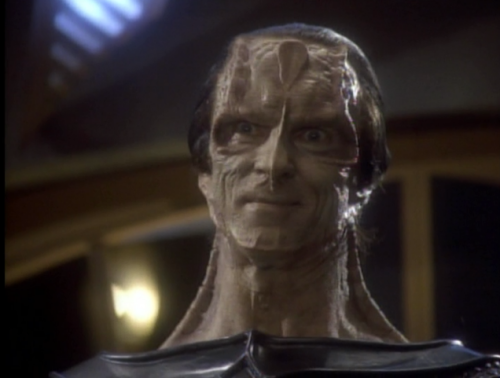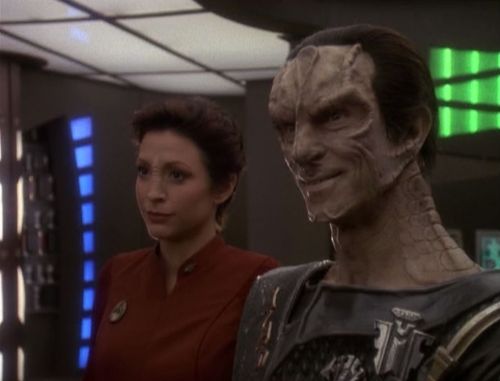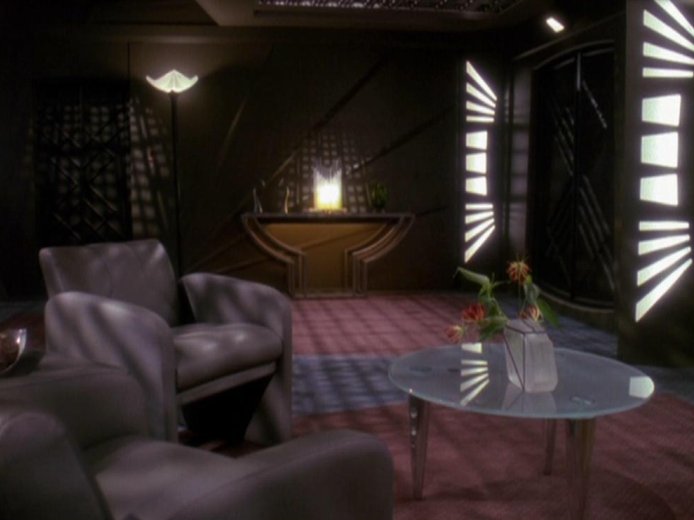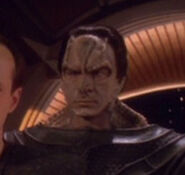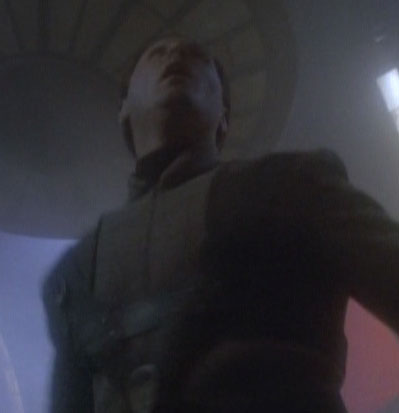One of the most fascinating (and time-consuming) parts of writing a Star Trek book is including lots of details that tie it together with the shows, movies and books that are already out there. I recently watched the DS9 episode "Cardassians" (2x05), in which the character Garak enjoyed a smelly beverage called rokassa juice, saying it calmed his nerves. As soon as he said that, I knew rokassa juice had to be in the novel.
One of the main characters in Cardassian Language is a military commander in wartime: a tough, proud leader in an already arrogant, macho culture. It would be all too easy to paint him as an irredeemable villain with no weaknesses, no doubts, no humanity. Of course, if I did that, he wouldn't feel real and I wouldn't be much of a writer, but I can't have him collapsing in a POW's arms and sobbing, either. That's where rokassa juice comes in.
In its introductory scene, it's not the rokassa juice that tells the reader he's having a bad day: we get a rare opportunity to use a battle injury to hint at his vulnerabilities. But the rokassa juice will, if I do my job right, establish itself over time as a clue or symbol, and be very useful in scenes where there are no convenient bodily signs.
Here's the passage, from Chapter 18, condensed it a bit for this post. We're on a Cardassian warship, and a human prisoner has been summoned for a chat with the Gul, or Captain:
 |
| Thanks to Paramount |
One of the main characters in Cardassian Language is a military commander in wartime: a tough, proud leader in an already arrogant, macho culture. It would be all too easy to paint him as an irredeemable villain with no weaknesses, no doubts, no humanity. Of course, if I did that, he wouldn't feel real and I wouldn't be much of a writer, but I can't have him collapsing in a POW's arms and sobbing, either. That's where rokassa juice comes in.
In its introductory scene, it's not the rokassa juice that tells the reader he's having a bad day: we get a rare opportunity to use a battle injury to hint at his vulnerabilities. But the rokassa juice will, if I do my job right, establish itself over time as a clue or symbol, and be very useful in scenes where there are no convenient bodily signs.
Here's the passage, from Chapter 18, condensed it a bit for this post. We're on a Cardassian warship, and a human prisoner has been summoned for a chat with the Gul, or Captain:
The Gul put one hand on his chair and the other on the desk and pushed himself up on his arms. Slowly, he transferred his weight to his legs and turned stiffly to the replicator. "Coffee, cream and sugar," he ordered, and "coffee, black."
"You're hurt," I said.
He put the cups on his desk and lowered himself slowly back into his chair. "A present from Starfleet," he quipped, "a small token of friendship."
"What's it all about, anyway, this war?" I stood, picked up my cup in its holder and sat down again.
"There was a time when I would have answered, 'Expansionist aggression,' but now I'm afraid it's become little more than a political game."
"Dangerous game," I observed. "I wonder if there's anything I can do."
"I doubt there's anything you could do without revealing your presence here."
"Wouldn't it be worth it to let the secret out, though? I mean, if it stops the war..."
"If it could stop the war, perhaps revealing your presence would be worth the consequences, yes. But it's much more likely to prolong the war instead."
"I see. You haven't touched your coffee."
He picked up his coffee, took a small sip and put it back down.
"Is your leg going to be okay?" I asked.
"Yes, thank you, it's just a temporary inconvenience. But I understand your injury is not from the battle."
I stared into my coffee. "No, not exactly."
"And I hear your Bajoran assailants managed to teach you quite a bit of their language in just a few minutes."
"Only simple words," I replied. "And really, Iba only kicked me to keep me from hitting my head."
"I believe your head would never have been in danger if you had not disobeyed my Riyak."
I gripped my cup-frame tightly with both hands in an effort to prevent them from flying up to my face. "True," I admitted.
"I'm more interested in your accelerated lesson in Bajoran," he said.
I sat back, tried to relax against the back of the chair and looked him in the eyes. "What do you want to know?"
"I want to know how you learned so fast. This was your first encounter with the language, I presume?"
"Yes, it was. I'm a linguist. I guess that's why," I shrugged. "I don't know."
"Then you spent the rest of the day learning Cardassian. How did that go?"
"It went pretty well. We cleared the hallways. I tried to learn some Cardassian, but I'm afraid I must have said something offensive. I didn't mean to. I was just trying to say what I thought I heard them saying."
"And that was...?"
"I thought it was 'o-shah.'"
Gillek allowed himself an amused smile. "You were correct; they were saying 'o-shah.'" He paused for a moment, staring at the ceiling, then looked back to me. "The common tongue, what you call the Cardassian language, is in many ways an accurate reflection and expression of Cardassian social structure."
"Naturally."
"I'll simplify it for you: you should always address Cardassians as 'shada,' never as 'o-shah.'"
"Okay," I replied. "I'll try to remember that. Will I be working with them again today?"
"No. You'll begin your new assignment in a few days."
"I'd like to learn more about the Universal Translator, if I could."
"I'll consider it."
"Thank you." It had only been a comment; I hadn't thought I'd need his permission to study a translation program. "Earlier you said something about turning the heat down in my room. That would be fine with me, actually. To be honest, it's a little too warm for my taste, and I know you're worried about expenses."
"I don't remember mentioning that," said Gillek, "but you're welcome to adjust the environmental controls in your quarters to suit your comfort."
"I am? Thanks. But how do I do that? I didn't see a thermostat."
"The same way you control the lights: by voice command. Might you be referring to my remark that not all the rooms in this ship are warm?"
"Yes," I said, "that was it."
"The rooms in question are specialized storage bays, but I've found they also function effectively as quarters for uncooperative prisoners. I'm afraid they are in fact cold, rather than comfortably cool as you imagine. There is one standing empty at the moment that is..." He grabbed a tablet from his desk and typed. "...52 degrees by your 21st century North American scale. Oxygen saturation is limited, to slow oxidization of stored materials; it's breathable but very thin. There are no shower or toilet facilities."
"And you would actually put me in there if I refused to work?"
"Of course. I enjoy our little meetings, Vaine, but there's no more time for this one. I'll send for you again another day."
"Yes, Gul." In spite of my efforts, it came out in a growl. I stood up and hobbled to the door, and found Dolim Shal waiting.
"Rokassa juice," I heard the Gul say as the door swished shut behind me.


